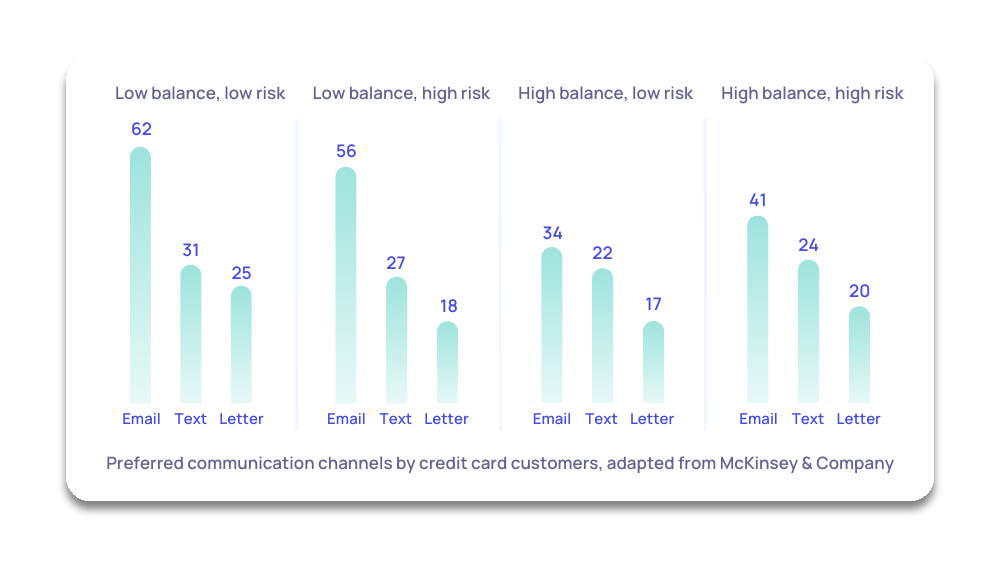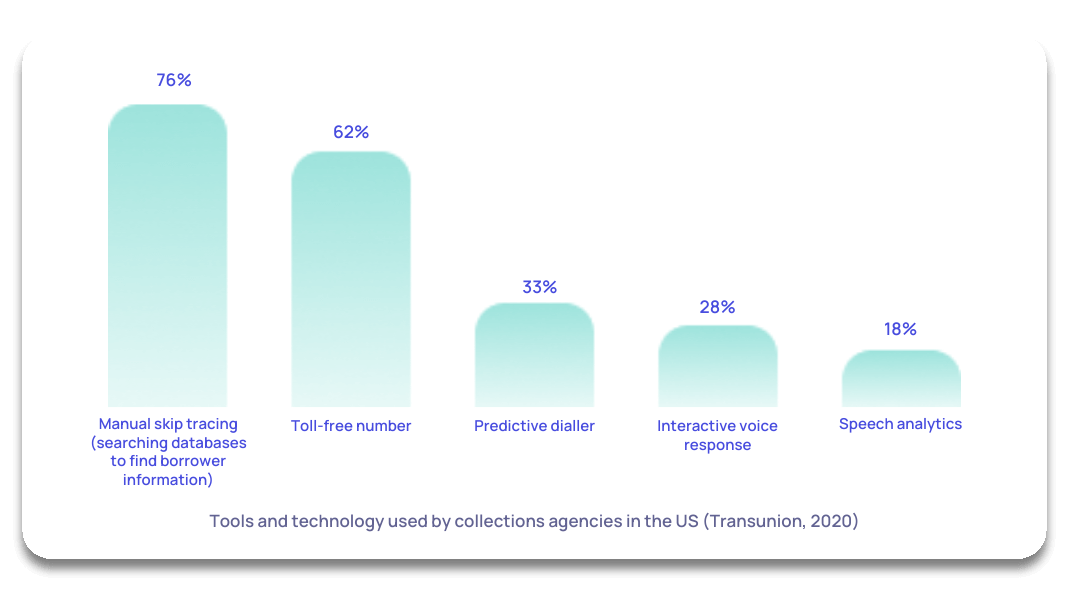Hanging up on traditional debt collection: How Reg F can improve communication in debt collection
What is Regulation F and why is it important?
In November 2021, the Consumer Financial Protection Bureau (CFPB) enacted a regulation to modernise the Fair Debt Collection Practices Act (FDCPA), originally established in 1977. ‘Regulation F’ tightens many restrictions already in place and makes a litany of updates to how debt collectors and creditors can communicate with consumers regarding overdue accounts, including:
- Limitations on the number of calls that can be made to consumers
- Green-lighting electronic communication for debt collection
- Giving consumers the right to stop specific types of communication, including the option to opt-out of electronic communication
- Requirements around providing expanded disclosures to consumers at the beginning of collection communications
While Reg F imposes new regulations on voice call collection practices, there’s a significant silver lining: it also green-lights electronic communication with consumers.
Consumer demand for digital communication is stronger than ever, especially in light of the pandemic, fast-tracking many businesses’ plans for developing omnichannel customer experiences. The collections industry isn’t immune to this demand, and Reg F presents an opportunity for businesses to appeal to consumers’ demand for communication via email and SMS. However, it also introduces a host of new criteria to consider as you evaluate debt collection partners. Now that the rules have changed, it’s essential to ensure your collections partner is modern, reputable, and perhaps most importantly, Reg F compliant.
Consumer demand for digital-first communication on the rise
There are nearly 80 million millennials in the United States alone, officially taking over as the largest consumer group, with over a trillion dollars in spending power. However, studies show that while millennials are becoming more willing to loosen their purse strings in recent years, they’re also the generation taking on the most debt. In fact, according to Experian, each millennial carries an average of $4,712 in credit card debt (never mind the student loans).
Needless to say this is the generation businesses should be most concerned with establishing an open line of communication with – and unfortunately, voice calls and mail miss the mark.
Millennial consumers grew up in the age of emerging social media and email. They’re comfortable navigating technology, switching between multiple channels and devices in a few clicks. More and more, they’re embracing SMS and chat applications as their preferred way to communicate with businesses. It’s really no surprise – in a survey conducted by PwC, nearly 80% of Americans surveyed listed efficiency and convenience as the most important elements of a customer experience.
Technology company BankMyCell recently conducted a survey in an attempt to understand this phenomenon – and the results make a pretty strong case for abandoning phone calls as a medium for outreach:
- 75% of millennials surveyed avoid phone because it’s time-consuming
- 46% of millennials surveyed are avoiding a verbal confrontation
- 64% of millennials surveyed are avoiding a whiny/needy person
What’s more, a 2019 McKinsey study examined customer communication preferences with regards specifically to debt collection, finding that regardless of debt balance or risk level, credit card customers resoundingly prefer to be contacted via email or text message.

While Regulation F serves as a signal to businesses to ‘hang up the phone,’ these trends clearly indicate that calls are outdated, and it’s in creditors’ best interest to abandon them as a primary communication channel, for even more practical reasons. Businesses who utilise a digital-first collections strategy can do a better job of meeting customer expectations for speed and convenience throughout the debt collections process.
Traditional debt collection vs. Intelligent debt collection
The COVID-19 pandemic exacerbated the requirement for digital self-service. According to BCG, early in the pandemic many businesses were forced to close physical stores, driving a 14% increase in call volumes at US-based call centres. However at the same time, customer use of web and app-based self-service tools increased 20%, forcing many companies to fast-track and scale their digital offerings. Over the course of the pandemic, technology-based communication has gone from a ‘nice-to-have’ to a critical, and expected component.
But while technology-infused collections practices are fast-emerging, letters, phone calls, and other outdated methods are still a mainstay for the roughly 7,000 debt collections agencies in the United States (a number that is, in fact, on the decline). In their 2020 collections report, TransUnion showed that just 9% of industry participants planned to put significant investment in software over the next two years.

Without dedicated investment, traditional collectors will continue to fall behind, leaving recovery rates to suffer. Not only are manual processes risky and ripe for human error, the experience is severely lacking for customers. Intelligent debt collection offers a huge advantage in communicating with customers by providing every customer with a personalised experience. By understanding their behavioural tendencies, communications can be delivered at a time that suits them, via a channel they prefer, increasing the likelihood of engagement, and ultimately improving recovery rates.
Choosing the best solution for your business
There’s no shortage of options available to businesses seeking support for debt recovery initiatives. Choosing the right option for your business can seem like a daunting task when so many options appear to be so similar, but there are some key considerations for narrowing the field – beyond recovery rates.
How is call volume and timing tracked?
Reg F’s guidelines largely restrict how often and at what time of day a customer can be contacted via a voice call. Traditional agencies often rely on manual tracking to monitor these metrics, leaving room to expose a business to risk of non-compliance, potentially leading to negative exposure and publicity.
Modern debt recovery solutions are rooted in technology, with the more advanced building compliance rules directly into the system. Not only can communications be more closely monitored this way, but the risk of accidental, non-compliant outreach is eliminated. Technology-based solutions are also ideal for businesses managing compliance rules in a variety of jurisdictions, making scaling compliance much more straightforward.
When are customer service representatives available for your customers?
Many agencies have representatives only available during normal business hours, sometimes further restricted by a specific timezone. This limits customers’ ability to get questions answered or make payments outside of those hours, dragging out the collections process and providing a subpar customer experience. The right partner for your business will have availability either live with a representative or online (or both) 24/7. At the very least, the customer service team you leverage should be available for questions in the local timezone of your required markets for a convenient customer experience, and options should be available to make payments online.
How are the individual customer service reps incentivised?
It’s rare for debt collection agencies to measure customer satisfaction, and even rarer for their agents to be incentivised on that metric. Most often, these reps are incentivised strictly on the amount of money they recover, which has the potential to yield more complaints from customers who are distressed by pushier tactics to collect. Debt collection partners who prioritise customer satisfaction as a key performance indicator bring businesses numerous benefits: operational efficiencies due to a reduction in customer complaints, a more positive brand sentiment, and higher recovery rates. Get a good idea for the experience your customers will have with your debt collections partner with a simple Google Search – often the reviews are very telling.
How InDebted complies with Regulation F and modernises the collections process
With regards to Reg F specifically, InDebted has been prepared from the start. With a digital-first, consumer-centric approach, InDebted has been able to provide a 40% increase in returns for customers over traditional debt collections agencies. We place a priority on customer satisfaction, ensuring every customer has a positive collections experience.
Additionally, InDebted prepared an in-depth analysis of Reg F and formed a Reg F Committee to investigate any potential impacts to business operations and verify processes to ensure compliance. InDebted continues to audit for compliance to ensure all company policies and procedures are working as designed.
Speak with salesJoin our newsletter for the latest collections insights

Thank you for subscribing!
Join our newsletter for the latest collections insights

Thank you for subscribing!
Share
Other resources
5 expert-backed tips for working with multiple collection agencies
Diversifying your collections panel can be a game changer for your organisation.AI debt collection vs. traditional methods: what's different?
While traditional debt collection is increasingly seen as out of touch, a new generation solution is disrupting the landscape — AI-powered debt collection. It puts the power back into customer’s hands, to manage their debt their way.Improving collections strategy by 30% with machine learning
Contacting customers digitally to recover overdue accounts is one way to improve your customer experience. But predicting how each customer prefers to engage, and adapting each step of their journey accordingly takes your collections to entirely new levels of personalisation.The state of financial wellbeing in Australia, the United Kingdom and the United States, and how collections can support
How are your consumers coping financially? See the state of financial wellbeing across key markets, featuring the latest insights and practical actions for supporting stretched customers.
